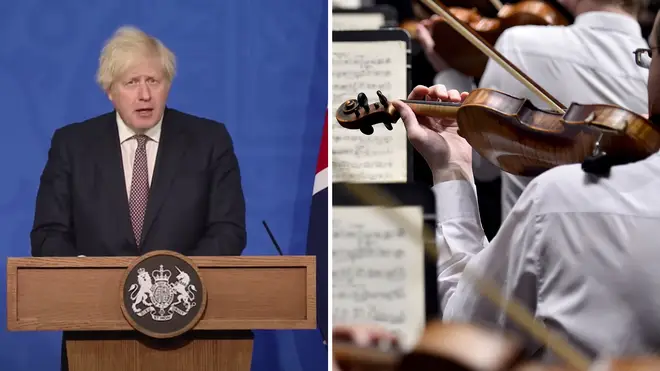On Air Now
Calm Classics with Ritula Shah 10pm - 1am
7 July 2021, 17:12

When all COVID restrictions officially lift on 19 July, it will be up to individuals if they wear masks or gather tightly in large crowds. Here’s what the classical world is likely to put into place.
On 19 July, classical music venues, concert halls, theatres and opera houses in England will open to full capacity for the first time since March 2020.
As all remaining COVID-19 restrictions are set to be lifted, people will have the choice of whether or not they wear face coverings in public, indoors and on public transport, and social distancing rules will be a thing of the past.
“We will move away from legal restrictions and allow people to make their own informed decisions about how to manage the virus,” Prime Minister Boris Johnson said in a press conference announcing the changes to COVID-19 restrictions on 5 July.
Venues will no longer require visitors to scan a QR code for NHS Test and Trace on arrival, and life will once again, after months of pandemic interruptions and restrictions, go back to at least some kind of ‘normal’.
So does this mean all classical music will be open, and be free and easy – as pre-March 2020? Here’s what we know about the UK classical world’s response so far…
Read more: Classical industry reacts to Boris Johnson’s approach to July 19 opening-up

YouTuber shows an incredible mashup of classical music
Overall, leading music industry figures have welcomed Boris Johnson’s announcement that on 19 July, following nearly a year-and-a-half of restrictions and losses for the arts sector, COVID-19 restrictions will largely disappear, and classical music can come back in full force.
However, many feel that insurance, and clear guidance for concert hall safety, remain areas that are unclear for organisers to navigate.
On 5 July, Boris Johnson said in a press conference that mask-wearing would be based on individual choice from 19 July onwards. At a classical concert, you can likely expect a mix of masked and non-masked audience members, so if you’re looking to reduce the risk of catching coronavirus, a mask could still be a good idea.
The PM has said: “We will end the one metre plus rule on social distancing, and the legal obligation to wear a face covering, although guidance will suggest where you might choose to do so, especially when cases are rising, and where you come into contact with people you don’t normally meet in enclosed places, such as obviously crowded public transport.”

Band of the Coldstream Guards play Three Lions outside Clarence House to wish England luck
The above on masks is worth bearing in mind, especially given that social distancing rules will no longer be in place, across the board, from 19 July onwards.
Venues have been shut for a long time (many since March 2020) and many are unable to run at reduced capacity due to the cost of putting on classical concerts, operas, theatre and other shows. Prime Minister Boris Johnson has said that the restrictions on “numbers of people attending concerts, theatre, and sports events” will all be lifted.
Therefore, it’s likely venues will be welcoming full audiences back to their seats on 19 July, meaning social distancing is unlikely to be enforced.
In his 5 July press conference, Boris Johnson said that the government aims to “manage the virus with a test, trace and isolate system that is proportionate to the pandemic.”
He outlined that we will still have to self-isolate if we test positive, or are told to do so by NHS Test and Trace. And for Test and Trace to work, there will surely have to be some kind of tracking system.
Detail remains scant on exactly how this will work, but compulsory QR codes have been reported as potentially being scrapped.

‘Thee Lions‘, played on the organ of the Royal Albert Hall by Robert Quinney
“There will be no Covid certificate required as a condition of entry to any venue or event,” Johnson has said. “Although businesses and events can certainly make use of certification and the NHS app gives you a Covid pass as one way to show your Covid status.”
The concept of a ‘vaccine passport’ is still one surrounded with controversy, and the government has said it’s not something they’re looking at currently.
Orchestra managers and concert organisers have welcome the news of the government’s lifting of restrictions on 19 July, but some have already questioned how insurance will be used to mitigate against ongoing pandemic uncertainty.
Phil Bowdery, chairman of Concert Promoters Association, has said: “While we absolutely cannot wait to safely welcome back our fans, we are missing one piece of the puzzle – insurance. We need a government-backed scheme to provide the security needed to start investing in events over the coming months, shoring up our industry and stimulating the wider economy as we build back following the pandemic.”
Chief exec of UK Music Jamie Njoku-Goodwin has echoed calls for an insurance scheme. In a tweet, he reminded that a full lifting of restrictions for summer doesn’t rule out the possibility of reintroducing them in winter, meaning “organisers won’t have confidence to plan events beyond summer.”
“It’s vital we get a gvt-backed insurance scheme to enable organisers to plan ahead without risk of financial ruin if restrictions reimposed,” he says. “The insurance scheme government introduced for the film and TV industry has been hugely successful and has saved countless jobs and businesses – we now need the same for the live events sector, otherwise we risk losing some festivals and music events forever.”
Visit www.gov.uk/coronavirus to keep up to date with the latest information.